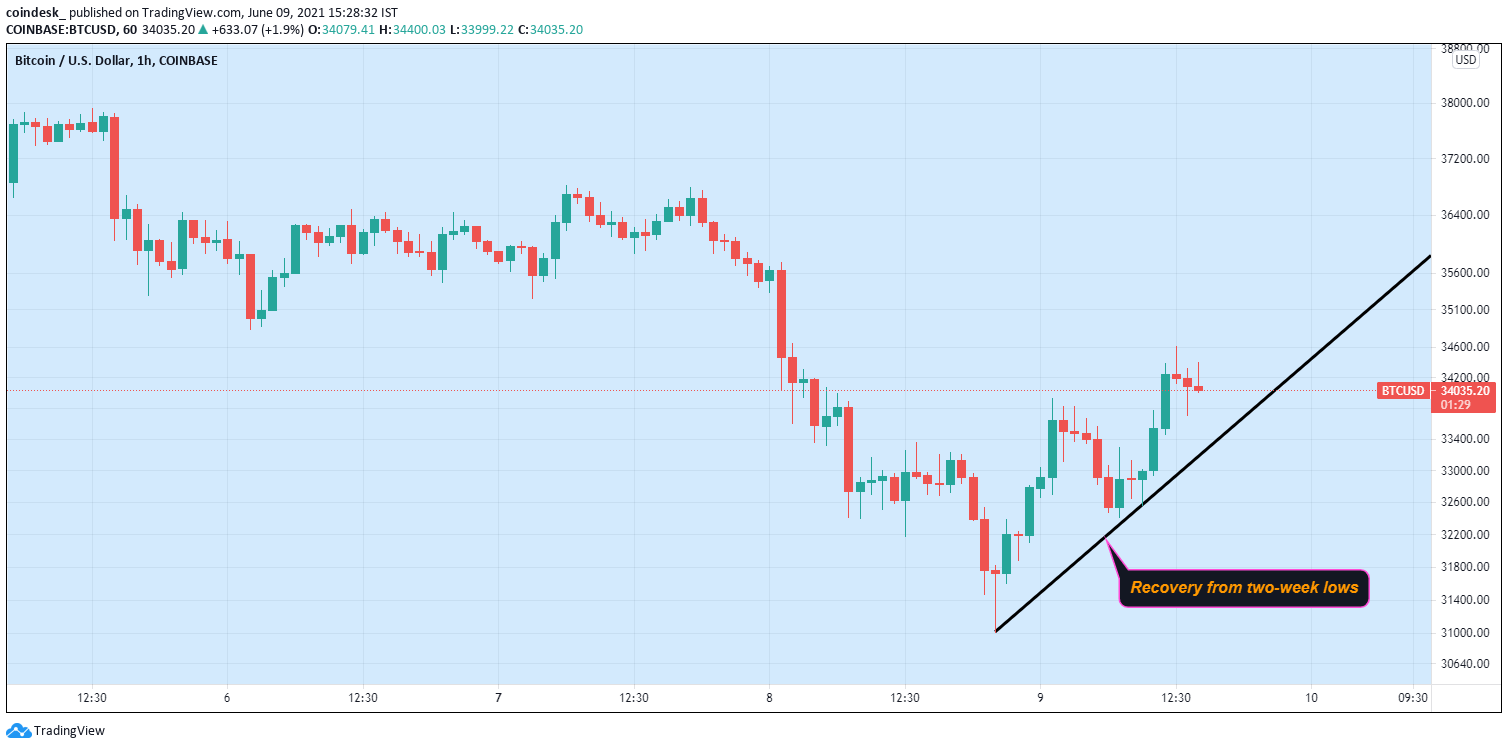
Bitcoin Jumps Most in 2 Weeks to $36K After El Salvador Passes Currency Law
Bitcoin's price jumped Wednesday by the most in two weeks amid mounting inflation concerns and hopes for mass adoption after El Salvador's parliament approved the cryptocurrency as legal tender.
The cryptocurrency was changing hands near $36,500 at press time, having picked up from a bid near $31,000 late Tuesday. The price was up 9% since 0:00 coordinated universal time, the biggest gain since May 24.
Data released by China early today showed the producer price index (PPI), also known as factory-gate inflation, rose 9% last month, the biggest year-over-year increase since September 2008.
China's PPI typically adds to inflationary pressures worldwide because the country is a major buyer and supplier globally.
"Rising costs everywhere, in particular in China, will be adding to global inflationary pressures," Dariusz Kowalczyk, an economist at Crédit Agricole, told the Financial Times. "I think we are going to live with higher inflation globally, and what's happening in China will contribute to that."
That's bullish for bitcoin, which is widely considered an inflation hedge because the pace of expansion of its supply is reduced by half every four years.
Bitcoin is up about 12% over the past 24-hours, showing near-term resilience. "The market is bottoming on bad news," wrote David Grider, strategist at FundStrat, in a newsletter published today.
China's Qinghai province has ordered all crypto miners to shut down based on government concerns about high energy usage. And the crackdown on money laundering intensified as Chinese authorities arrested over 1,000 people who allegedly used cryptocurrency to evade the law.
However, longer term, big gains may remain elusive for some time because of concerns that policymakers across the globe might increase interest rates or scale back liquidity-boosting asset purchase programs to contain inflation, a process known as tapering. Monetary tightening tends to dilute the appeal of the store of value assets like bitcoin and gold.
China is already sucking out liquidity from the system, as noted by Caixin Global. Meanwhile, the U.S. Federal Reserve's easy monetary policy has come under fire in recent weeks, with many experts arguing that it is not appropriate amid concerns about rising inflation.
"Concerns about the current policy stance of the Fed started with a few and is now turning into an avalanche of former central bank officials, economists, and market participants – and rightly so," Mohamed El-Erian, chief economic adviser for the German financial firm Allianz, tweeted.
Taper talk may escalate if the U.S. consumer price index, scheduled for release on Thursday, exceeds expectations. These concerns are here to stay, as Messari analyst Mira Christanto recently noted, and may keep the market from cheering other positive developments like El Salvador's bitcoin adoption.
El Salvador's parliament approved bitcoin as legal tender early Wednesday, mandating all businesses to accept bitcoin for goods and services. The move has raised hopes for widespread sovereign adoption.
Other nations, however, may choose to see how things pan out in the Latin American country before following its lead.
And despite bitcoin's price correction in recent months from the all-time high near $65,000 reached in April, signs continue to mount of growing demand for cryptocurrencies from institutional buyers and brokerage firms.
Victory Capital, a Texas-based money manager, said it plans to enter the crypto market through a private fund for accredited investors that will track the Nasdaq Crypto Index.
And Cointelegraph reported that Michael Saylor's MicroStrategy, which has advocated for big corporations to use bitcoin as a treasury asset, has seen overwhelming investor demand for a planned junk-bond offering that would raise at least $400 million to buy more of the cryptocurrency.
DISCLOSURE
The leader in news and information on cryptocurrency, digital assets and the future of money, CoinDesk is a media outlet that strives for the highest journalistic standards and abides by a strict set of editorial policies. CoinDesk is an independent operating subsidiary of Digital Currency Group, which invests in cryptocurrencies and blockchain startups. As part of their compensation, certain CoinDesk employees, including editorial employees, may receive exposure to DCG equity in the form of stock appreciation rights, which vest over a multi-year period. CoinDesk journalists are not allowed to purchase stock outright in DCG.

